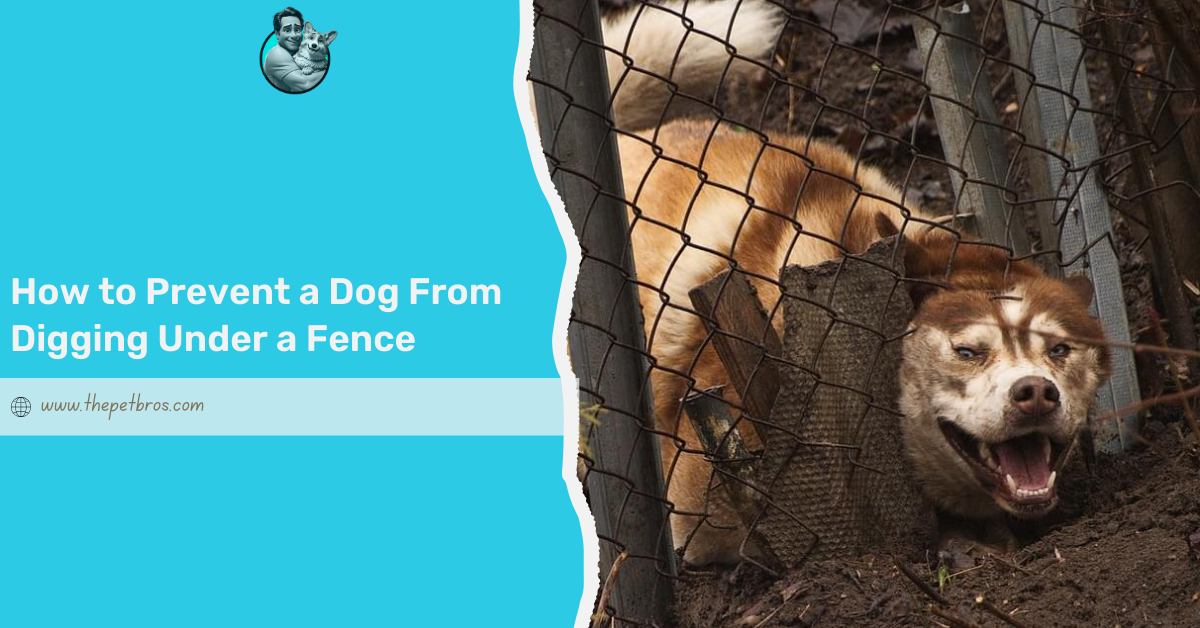Some dogs chase balls, while some chase squirrels. Then there are the dogs who chase freedom, and they do this by digging one hole under the fence at a time. For them, digging isn’t just a behaviour; it’s a lifestyle. They’ve got dirt on their paws, a sparkle in their eyes, and a secret tunnel project underway in your backyard. But how do you prevent such dogs from digging under your fence?
But before you start building a moat or installing a laser security system (tempting, we know), it helps to understand what’s driving all this digging. Now, the first question you should ask yourself is, is your pup bored or anxious? Because there’s usually a reason behind this behaviour.
So, if you’re tired of filling in escape holes and playing “Where’s the dog?” at 7 AM, this guide’s for you. Let’s break down why dogs dig, how to stop it, and what you can do when your backyard starts to look more like a minefield.
Understanding Why Dog Digs Under Fences
To find a lasting solution that prevents your dog from digging under your fence, we must circle back to the genesis of such upsetting behaviour. Digging is a natural canine instinct, but when it leads to escape attempts, damaged yards, or safety risks, it becomes a real problem. Understanding why your dog digs is the first step to stopping it.
Top 4 Reasons Why Dogs Dig Under Fences
1. Instinctual Behaviour
Dogs aren’t just out to test your patience. Instincts drive some of the traits they exhibit and needs we humans often overlook. For some breeds, like Terriers or Dachshunds, digging is in their DNA. These pups were bred to hunt small prey underground, so tunnelling under a fence feels as natural as chasing a ball. Even non-hunting breeds might dig to mimic their wild ancestors, who created dens for safety or comfort.
Signs of hunting instinct digging could include:
- Digging in specific spots repeatedly
- Interest in small animals or underground scents
- Pawing at the ground before digging
2. Boredom and Energy
Boredom is another widespread trigger. If your dog goes on long hours alone and enjoys activity or toys they have grown tired of chewing, they could use digging as a self-made adventure. You can bet that it’s both thrilling and rewarding for them: dirt flies, they catch on latent smells, and, suddenly, they’re on a mission to unearth whatever that is, at least, until they eventually burn out the excess energy.
Signs of boredom-induced digging could include:
- Digging occurs randomly across the yard
- The dog appears restless or destructive
- Lack of toys or interaction in the yard
3. Escape Motives
Sometimes, their escape artist instincts kick in, thanks to some distraction. A squirrel on the other side, a female announcing that she is in heat down the street, or even anxiety from loud noises can send your dog burrowing for freedom. Unneutered males, especially, are notorious for this, as their hormones drive them to roam.
Signs of escape-driven digging could include:
- Digging near the fence line, especially at weak points
- Increased activity or excitement when outside
- Attempts to squeeze through gaps
4. Seeking Comfort
Sometimes, the reason your dog digs under the fence is climatic. On a hot day, it might dig a cool spot to lie in. Signs of comfort-seeking digging could include:
- Digging holes large enough to lie in
- Digging occurs more in hot or cold weather
- The dog rests in the hole after digging
Practical Solutions to Prevent Dog From Digging Under Your Fence
Now that you’ve cracked why your dog’s digging under your fence, let’s get to the good stuff: how to stop it. Several experts have come up with solutions, from quick fixes to long-term strategies, all designed to keep your yard intact and your dog out of trouble.
1. Physical Barriers
One of the simplest ways to thwart digging is to make it impossible. Proven strategies include burying chicken wire or large rocks along the base of your fence, about a foot deep, to create an underground shield, or installing an L-foot around your fence so your dog hits a dead end when they start tunnelling.
These tricks help deter determined diggers, especially escape artists pursuing temporary distractions. However, while they prove effective, they are costly to set up and might not necessarily address the main reason your dog is digging unless combined with other tricks.
2. Mental and Physical Stimulation
A bored dog is a digging dog, so give them something taxing to do. Activities like long walks, a game of fetch, or a playdate with a buddy can burn off that restless energy. However, for hopeless diggers who are simply fascinated by what they can do with their claws, create a designated digging zone.
A sandbox with buried treats or toys can turn their instinct into a game you entirely control. According to a recent study, this satisfies their need to dig without wrecking your fence line. Plus, it’s a win-win because your yard is desecrated, and your dog is happy.
3. Training and Deterrents
When you catch them in the act, positive reinforcement can make training work wonders. Instruct them lightly that they should keep away and reward them with treats or praise when they stay away from the fence. Equally, for a quick deterrent, you can sprinkle citrus peels, a light dusting of cayenne pepper, or any other items with smells dogs hate, along with their favourite dig spots.
Most importantly, avoid yelling and punishment as it can reinforce their anxiety and make the digging worse. Consistency is key here; they’ll learn the fence isn’t their playground over time.
4. Environmental Fixes
If your dog digs to chase something, say an easy prey or a mate in heat, block their view with a privacy screen or tall plants. Spaying or neutering is also recommended to reduce hormone-driven escapes, especially for males. Minor tweaks like these tackle specific triggers, making your yard less of a mess.
What to do When the Digging Persists
What if you’ve tried everything, and your dog’s still channeling their inner archaeologist? Yeah, we zeroed in on the possibility, too, and here are a few things you can do:
- Breed-Specific Tips: Some breeds, especially Huskies, Terriers or Jack Russells, are stubborn diggers. Hence, extra supervision and stimulation must also be incorporated.
- Controlling Anxiety-Driven Digging: If dogs are driven by anxiety, such as by thunderstorms or separation, puzzle toys could help. You could also consult a vet for calming aids.
- Reassuring Persistent Escapists: For relentless escape artists, double-check your setup and try to provide a tailored response to their need. Most times, combining barriers with training could help scope out whatever is luring them, maybe a neighbor’s dog. Making arrangements for them to hang out with other dogs or getting them a partner could help reassure them that their environment is just right.
- Encouragement: Don’t give up; fine-tuning your approach to address the main trigger, combined with patience, will crack even the most challenging cases. Your yard’s worth the effort as much as your dog’s safety.
Conclusion
Stopping your dog from digging under the fence isn’t about screaming your lungs out. Whether they’re driven by instinct, boredom or a quest for freedom, you’ve got the tools: sturdy barriers, more playtime, clever training and a few environmental hacks. It’s more about meeting their needs while keeping your boundaries intact. Start small; take them for an extra walk today, or bury a toy in a sandbox and watch the magic happen.
Got a success story where you successfully prevented dogs from digging under your fence or are you still struggling with your dog’s digging dilemma? Drop it in the comments below. Your dog could dream of tunnelling to freedom, but with these tricks, they’re no match for your fence.
FAQs
Is digging a sign my dog is unhappy?
Not always. Digging can just be fun or instinctual, especially for specific breeds. But if it’s excessive or paired with pacing or whining, it might hint at stress. It’s advisable to check their routine and environment and, ultimately, to see a vet.
Why does my dog only dig under the fence at night?
Nighttime digging could signal boredom or anxiety, especially if the dog is alone for long stretches. Nocturnal critters like raccoons might also be luring them. Add a nightlight, extra evening playtime, or a barrier to block temptations.
Can I train my dog to stop digging completely?
Positive reinforcement and alternative outlets can significantly reduce unwanted digging, but some digging is natural for dogs.














